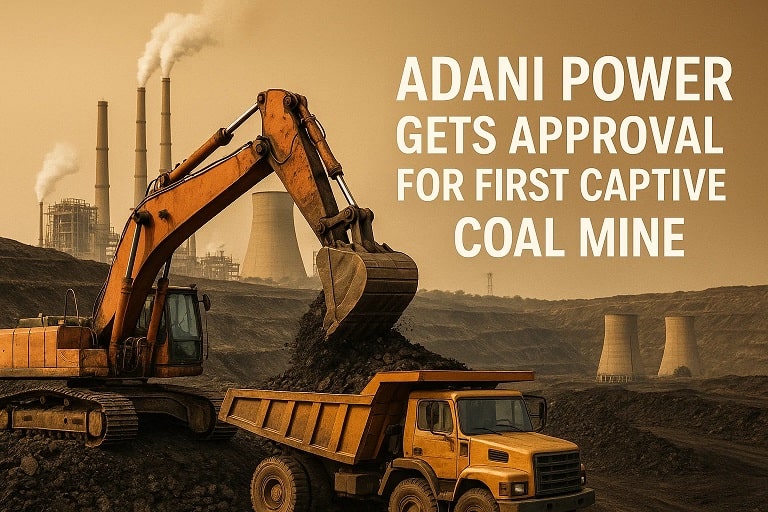Adani Power Gets Approval for First Captive Coal Mine: A Strategic Move for Energy Security
On September 2, 2025, Adani Power Limited, India’s largest private thermal power producer, received approval from the Ministry of Coal to commence operations at its first captive coal mine, the Dhirauli Mine in Singrauli district, Madhya Pradesh. Operated by Mahan Energen Ltd., a wholly-owned subsidiary, the mine has a peak production capacity of 6.5 million tonnes per annum (MTPA), with 5 MTPA from open-cast mining and 1.5 MTPA from underground operations, and holds a gross geological reserve of 620 million tonnes. This milestone enhances Adani Power’s raw material security, supports the expansion of its 1,200 MW Mahan Power Plant to 3,200 MW, and aligns with India’s energy security goals. This article explores the drivers behind the approval, the historical context of Adani’s coal ventures, future projections, and the broader impacts across industries, with a focus on Tamil Nadu’s indirect role through its Adani Power operations.
Why This Approval Matters
The Dhirauli Mine approval marks Adani Power’s first foray into captive coal mining, reducing reliance on external coal supplies amid global supply chain disruptions and rising energy demands. With India’s coal-based power capacity at 211 GW in 2024, contributing 50% of electricity generation, the mine strengthens Adani’s leadership in the sector. For Tamil Nadu, home to Adani Power’s 1,320 MW Tiroda plant, the approval indirectly supports stable power supply and economic growth in the state’s industrial hubs like Chennai.
Latest Developments Driving the Approval
The Ministry of Coal’s approval on September 2, 2025, enables Adani Power to begin mining at the Dhirauli block, a significant step toward backward integration. The mine’s coal will fuel the 1,200 MW Mahan Power Plant, which is undergoing a 3,200 MW expansion, and meet merchant power needs. The approval follows Adani Power’s recent Letter of Award from MP Power Management Company Ltd. for an 800 MW ultra-supercritical thermal plant in Anuppur, Madhya Pradesh, announced days earlier.
Key Highlights of the Approval
- Dhirauli Mine Details: The mine, owned by Mahan Energen Ltd., has a peak capacity of 6.5 MTPA (5 MTPA open-cast, 1.5 MTPA underground), with a 30-year lease and reserves of 620 million tonnes (net 558 million tonnes), ensuring decades of fuel security.
- Responsible Mining: Adani Power plans to wash and process coal on-site to minimize impurities and emissions, aligning with its sustainability goals, though environmental concerns persist.
- Economic Impact: The mine optimizes input costs, enabling competitively priced power for consumers. It supports the Mahan plant’s expansion, adding 3,200 MW by 2027.
- Market Response: Adani Power’s shares rose marginally to Rs 606.95 on September 2, 2025, reflecting investor confidence in enhanced fuel security.
- Tamil Nadu Connection: While the mine is in Madhya Pradesh, Adani Power’s Tamil Nadu operations, including the Tiroda plant, benefit from the company’s broader cost efficiencies and stable coal supply.
Strategic Context
The approval comes amid India’s push for energy security, with coal demand projected to rise to 1.5 billion tonnes by 2030. Global pressures, including US tariffs and geopolitical tensions, have prompted India to bolster domestic coal production. However, environmental concerns, such as those raised about Adani’s Suliyari mine in Singrauli, highlight ongoing challenges in balancing energy needs with ecological impacts.
Historical Context of Adani’s Coal Ventures
Adani Group’s coal journey began in the 2000s, evolving from port operations to mining and power generation. Its coal-related businesses, including mines in India, Indonesia, and Australia, contribute over 60% of its revenue, despite controversies over environmental and bidding practices.
Key Milestones in Adani’s Coal Operations
- 2006-2010: Adani became India’s largest coal importer (11 million tonnes) and won Orissa mine rights in 2010, establishing itself as the largest private coal miner.
- 2011-2014: Acquired Australia’s Carmichael mine (10 MTPA) and Abbot Point port. In India, Adani began mining at Parsa East Kente Basan in Chhattisgarh, facing protests over environmental damage.
- 2015-2020: The Carmichael mine faced legal challenges and the “Stop Adani” campaign, downsizing from 60 MTPA to 10 MTPA. In India, Adani won Suliyari and Talabira mines, raising concerns about tribal displacement.
- 2023-2024: Adani secured Mara II Mahan (956 million tonnes) in Singrauli, despite allegations of bid rigging due to limited competition. The National Green Tribunal overturned approval for Gare Pelma II due to flawed public hearings.
- 2025: The Dhirauli Mine approval marks Adani Power’s first captive mine, reinforcing its dominance with 18,110 MW capacity across 12 plants, including Tamil Nadu’s Tiroda facility.
This history underscores Adani’s aggressive expansion in coal, often criticized for environmental and procedural irregularities, yet pivotal for India’s energy needs.
Future Scopes and Projections
The Dhirauli Mine is expected to reach its open-cast peak capacity of 5 MTPA by FY27, with underground mining starting in 2034. It will support Adani Power’s 18,110 MW capacity and future expansions, including the 3,200 MW Mahan plant addition. India’s coal production is projected to hit 1.2 billion tonnes by 2030, with Adani contributing significantly through its 22 operational and proposed mines totaling 7.6 billion tonnes in reserves.
Long-Term Strategic Outlook
By 2035, Adani Power aims to expand its capacity to 26 GW, leveraging captive mines like Dhirauli to reduce costs by 10-15%. Tamil Nadu’s Tiroda plant could benefit from stable coal pricing, supporting industrial growth in Chennai and Coimbatore. However, Adani’s coal focus contrasts with India’s 500 GW renewable energy goal by 2030, creating a tension between short-term energy security and long-term sustainability.
Potential Challenges
- Environmental Concerns: Singrauli’s mining cluster, including Dhirauli, faces scrutiny for water pollution and tribal displacement, with past projects like Suliyari drawing legal challenges.
- Bid Rigging Allegations: Adani’s history of securing coal blocks with limited competition, as seen with Mara II Mahan, raises transparency concerns.
- Global Pressures: US tariffs and climate policies could impact coal exports and financing, while India’s net-zero 2070 goal may limit coal expansion.
- Community Opposition: Local resistance in Singrauli over land acquisition and ecological damage could delay operations, as seen with other Adani mines.
Impacts on the Indian Economy and Stakeholders
The Dhirauli Mine approval enhances Adani Power’s fuel security, stabilizes power prices, and supports India’s energy-intensive growth. Tamil Nadu’s industrial ecosystem benefits indirectly through Adani’s broader operations, reinforcing its role as a power and manufacturing hub.
Sector-Wise Impacts
Energy and Power
- Impact: The mine ensures fuel for Adani’s 18,110 MW capacity, including Tamil Nadu’s Tiroda plant, supporting India’s 7% annual power demand growth. It reduces reliance on imported coal, saving $1 billion annually.
- Economic Contribution: The mine could add Rs 5,000 crore to GDP through power generation and job creation, with Tamil Nadu gaining from stable industrial power supply.
- Business Opportunities: Coal processing firms and equipment suppliers in Tamil Nadu will see demand, with Adani’s logistics network boosting port activities in Chennai.
Mining and Infrastructure
- Impact: Dhirauli’s 6.5 MTPA capacity creates 2,000 direct jobs and 5,000 indirect jobs in Madhya Pradesh, with Tamil Nadu’s infrastructure firms supporting Adani’s supply chain.
- Economic Contribution: Mining could contribute Rs 2,000 crore to regional GDP, with Tamil Nadu’s logistics sector gaining Rs 500 crore.
- Business Opportunities: Mining equipment and construction firms will secure contracts, with Tamil Nadu’s ports facilitating coal transport.
Financial Markets and Investment
- Impact: Adani Power’s shares rose 0.5% post-approval, with investor confidence in its 30-year lease. The company’s $1 billion bond issuance in 2024 reflects strong market support.
- Economic Contribution: The mine could attract $500 million in FDI, with Tamil Nadu’s financial hubs benefiting from related investments.
- Business Opportunities: Green bonds and infrastructure funds will target Adani’s projects, with Tamil Nadu’s banks financing supply chain SMEs.
Environment and Community
- Impact: On-site coal washing aims to reduce emissions, but Singrauli’s mining cluster risks water and air pollution, impacting 90 villages. Tamil Nadu’s environmental regulations may influence Adani’s practices.
- Economic Contribution: Community compensation and CSR initiatives could inject Rs 100 crore into local economies, though Tamil Nadu’s impact is indirect.
- Business Opportunities: Environmental consultancies will see demand for impact assessments, with Tamil Nadu firms supporting Adani’s sustainability efforts.
Dhirauli Mine Specifications
|
Mine |
Location |
Peak Capacity (MTPA) |
Reserves (MMT) |
Start Year |
Key Use |
|---|---|---|---|---|---|
|
Dhirauli |
Singrauli, MP |
6.5 (5 open-cast) |
620 (gross) |
FY27 |
Mahan Plant, Merchant Power |
|
Mara II Mahan |
Singrauli, MP |
TBD |
956 |
TBD |
Mahan Plant |
|
Parsa East Kente |
Chhattisgarh |
15 | 500 | 2013 |
Power Plants |
|
Carmichael (Bravus) |
Queensland, Australia |
10 | 1,000 | 2021 |
Export to India |
This table compares Dhirauli with other Adani mines, highlighting its role in fuel security.
Frequently Asked Questions (FAQs)
What is the Dhirauli Mine approval?
On September 2, 2025, the Ministry of Coal approved Adani Power’s first captive coal mine in Singrauli, Madhya Pradesh, with a 6.5 MTPA capacity to supply the Mahan Power Plant and merchant power needs.
Why is this significant for Adani Power?
It ensures fuel security, reduces import costs by $1 billion annually, and supports the 3,200 MW expansion of the Mahan Power Plant, strengthening Adani’s 18,110 MW capacity.
How does Tamil Nadu benefit?
Tamil Nadu’s Tiroda plant benefits from Adani’s cost efficiencies, stabilizing power supply for industrial hubs like Chennai, with indirect economic gains of Rs 500 crore.
What are the environmental concerns?
On-site coal washing aims to reduce emissions, but Singrauli’s mining cluster risks water pollution and tribal displacement, drawing scrutiny from environmentalists.
What challenges could impact the mine?
Environmental protests, bid rigging allegations, and global climate pressures could delay operations or increase costs, as seen with Adani’s other mines.





















